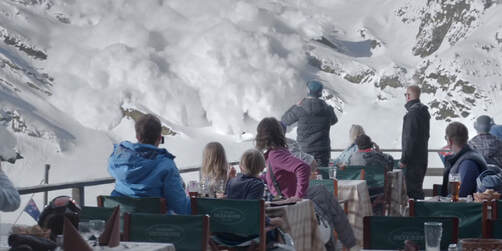TBD | A family has to reevaluate itself after the father has an unflattering reaction to a fake avalanche. Directed by Ruben Ostlund Starring Johannes Bah Kuhnke and Lisa Loven Kongsli Review by Jon Kissel |

The instigating scene of Force Majeure is incredible, happening in one shot with maybe a sneaky cut in a white-out. Ostlund constructs the scene with a snowy mountain in the left quarter of the screen, and the patio in the other three quarters. He had already included the explosions prior to the avalanche scene, such that the viewer has no reason to think anything of them. When one sounds in the distance, it's become part of the film's score, something to shrug off as a world-building tool. While the family continues about their business in the foreground, a rush of snow is coming down in the background. The sound of it gets louder and louder, until everyone is in a full on panic and the vapor generated by the snow has reduced visibility to nothing. Ostlund's camera never moves, even during the white-out. As the vapor slowly dissipates, Emma is calming her kids while Tomas re-enters the frame, unwilling to acknowledge the elephant in the room. It's one of those pushed-back-into-your-seat moments that makes movies worth watching.
The fallout from this scene, justifiably, is dealt with throughout the rest of Force Majeure. It's a universal expectation for parents to say they would die for their children, but luckily for most, those are just claims without evidence. For Emma, it proved true, but for Tomas, in the milliseconds it took him to react, it didn't. The kids had that expectation, and passive-aggressively revolt against their father. They're instantly distant and sullen and unhelpful, refusing to hold the door open for Tomas while he struggles with his ski equipment. The settings for the warm earlier scenes are replicated, having now become chilly and near-hateful. Ostlund repeatedly shows the resort's tractors smoothing out the slopes for a new day, but within the hotel, what's been altered won't be as easily repaired.
The exploration of masculinity that Force Majeure is most interested in kicks off once the family's friends show up. Emma's married friend Charlotte (Karin Myrenberg) didn't bring her husband to the resort, the better to indulge in her open marriage. Emma feels openly challenged by this, especially in the wake of Tomas's reflexive cowardice. If he's not interested in physically protecting them, and if she now has Charlotte as an example of not needing her husband for sexual fulfillment, the reasons for being married are shrinking. However, as Tomas's friend Mats (Kristofer Hivju) points out, they don't live in a state of nature where everything must be violently guarded. The resources that Tomas accumulates for his family are enough that they can vacation in this opulent place. Mats doesn't necessarily believe this, but his young girlfriend Fanni (Fanni Metelius) now has doubts about Mats's own courage in the wake of this bombshell. On a day out by themselves, Mats's and Tomas's impressions of their male identities are further wounded when they're reminded of their decaying looks, and Tomas runs into the incomprehensible habits of young men half his age. Ostlund methodically dismantles Tomas until he finally reaches a pathetic catharsis that leaves what's left of his masculinity in a puddle on the floor.
Well-acted, written, and directed, Force Majeure is also deeply thought-provoking in its themes. Everything that proceeds after the avalanche is edge-of-your-seat, hands-on-head tense and/or awkward, culminating in a horrifying finale laced with dread about what could happen next. Ostlund's version of masculinity is revealed to be the willingness to admit weakness. If Tomas could've done that, it would be a much shorter film, but thankfully, he's as stubborn as an HBO anti-hero. A
 RSS Feed
RSS Feed